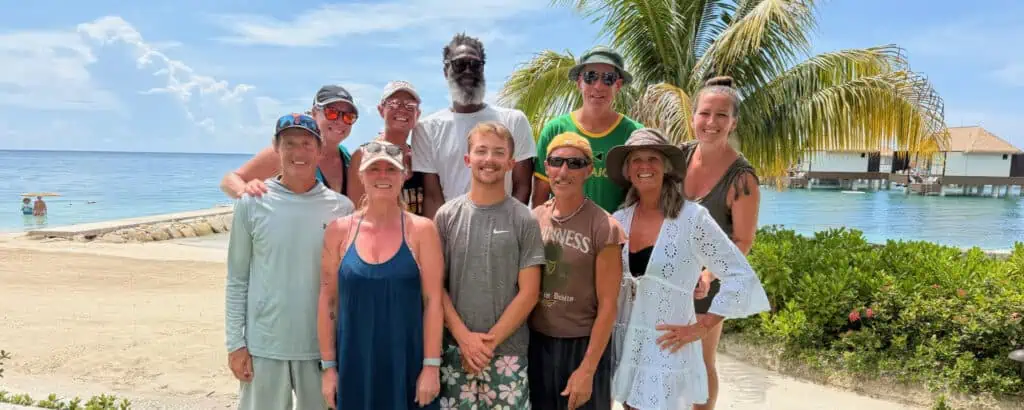Travel Tips
5 Secrets to Stress-Free Vacation Planning: The Ultimate Guide to Easy Travel

Planning a vacation should be exciting, not stressful, but all too often it feels like a juggling act, with flights, hotels, and activities pulling you in every direction. If you’ve ever found yourself overwhelmed by too many details or worried you’re missing something important, you’re not alone. That’s exactly why this guide breaks down five simple secrets to help you plan your next getaway without headaches or hassle, so you can focus on what really matters: enjoying your time away.
The five secrets to stress-free vacation planning include avoiding over-planning to keep your trip enjoyable, maintaining a flexible itinerary with open time for spontaneous activities, setting clear trip goals collaboratively with all travelers, conducting thorough research about your destination beforehand, and practicing light packing to minimize travel hassles. Following these principles ensures a relaxing and memorable vacation experience.
Decoding Stress-Free Planning Secrets
The very first secret to reducing vacation stress lies in knowing where your stress begins. Many travelers find themselves overwhelmed simply because they try to do everything at once: cramming flight searches, lodging options, and activity bookings into a few frantic days. The antidote is to prioritize planning time, set aside specific blocks in your calendar devoted solely to mapping out your trip.
This focused approach prevents rushing decisions and leaves breathing room to thoughtfully consider each element of your vacation. When you’re not scrambling last minute, you invite calm and clarity into the process.
Once the rhythm of planning is established, another crucial piece emerges: seeking expert help when needed. Vacation planning services like VibeGetaways are designed precisely for travelers who want to reclaim their time and reduce uncertainty.
Our services do more than just book hotels or flights, we tailor itineraries based on your preferences, budget, and travel style, managing all the moving parts that can otherwise feel overwhelming. Using a trusted service offers both peace of mind and access to insider knowledge, freeing you from juggling complex logistics alone.
Imagine turning what could be a chaotic task into an effortless experience where every detail has already been thoughtfully arranged. That’s exactly why enlisting professional help isn’t just a luxury; it’s smart planning.
Alongside professional support, making a commitment to research your destination thoroughly remains essential.
Understanding local customs, transit options, typical costs, and payment methods limits surprises upon arrival. Equipping yourself with this knowledge reduces moments of confusion or frustration and empowers you to navigate unfamiliar territory with confidence.
Equally important is embracing flexibility in your schedule.
Over-planning often means packing every moment with activity, which can quickly lead to exhaustion rather than relaxation. Leaving entire days open for spontaneous adventures or well-needed rest honors the true purpose of vacation, to recharge.
In fact, research shows that unscripted moments often become the most treasured memories on any trip.
| Planning Secret | Why It Matters | Practical Benefit |
| Prioritize Planning Time | Avoids last-minute rush and poor decisions | Creates calm and intentional organizing |
| Using Professional Services | Leverages expert knowledge and detailed management | Reduces mental load and errors |
| Destination Research | Anticipates challenges before travel | Smooth arrival and efficient navigation |
| Maintaining Flexibility | Prevents burnout from over-scheduling | Encourages enjoyment and spontaneity |
With these planning essentials integrated into your approach, you position yourself for a travel experience that flows naturally between preparation and discovery.
Next, gaining sharp insights into your chosen destination will further elevate how smoothly your trip unfolds.
Smart Destination Research
Knowing your destination inside out is more than just collecting trivia, it’s about equipping yourself with information that transforms unknowns into confidence. When you understand a place deeply, everything from budgeting to navigating daily routines becomes smoother. This preparation helps avoid last-minute surprises that often turn relaxing vacations into stressful ordeals. For instance, by investigating practically everything, from the type of electrical plugs used to peak tourist seasons, you protect your trip from common pitfalls.
It’s especially crucial nowadays to stay ahead of ever-changing travel dynamics. Government policies, entry requirements, and local health advisories can shift rapidly. A recent example includes the 2025 travel restrictions affecting certain countries, highlighting how visa eligibility and documentation can suddenly complicate travel plans. By regularly checking official embassy websites or trusted platforms before booking or departure, you save yourself frustration and keep your itinerary flexible when facing unexpected developments.
Another vital aspect is cultural awareness. Understanding local customs prevents embarrassing moments and enriches your experience by fostering meaningful connections with locals. Imagine arriving informed about greeting rituals or tipping etiquette, small gestures that open doors and hearts. Resources such as Lonely Planet or dedicated travel forums offer personal stories and detailed cultural dos and don’ts to prepare you for authentic interactions rather than superficial tourist encounters.
Budgeting realistically is key, as an unrealistic travel budget ranks among the biggest stressors on any trip. Beyond airfare and hotel costs, daily expenses like meals, transportation, and attraction fees add up quickly. Using tools like Numbeo provides up-to-date insights into cost-of-living variations across cities worldwide, enabling you to forecast expenses more accurately and avoid unpleasant money worries once you arrive.
After pinpointing these details, from entry rules to meal prices, your sense of control over the trip strengthens noticeably. This mental calmness is essential for stress-free planning because it reduces uncertainty, a prime source of anxiety before travel.
Armed with comprehensive knowledge about your chosen locale, you’re well-prepared to move forward in shaping an itinerary that aligns perfectly with your interests and budget considerations.
Crafting a Flexible Itinerary
A flexible itinerary is truly the heartbeat of stress-free travel. Rather than chaining yourself to a rigid schedule filled with back-to-back attractions and timed tours, crafting your plan with breathing room invites spontaneity and reduces pressure when things don’t go exactly as planned.
Imagine arriving in a vibrant city like Florence: instead of racing from museum to museum, a well-balanced itinerary blends landmark visits with open pockets of time simply to wander, sip coffee, or discover an unexpected street performance.
This blend of structure and freedom requires thoughtful balance. Start by identifying the essential experiences you don’t want to miss, perhaps a sunrise hike, a famous art gallery, or a local market. Allocate your prime energy hours to these highlights, ensuring they don’t feel rushed.
Then consciously carve out substantial periods free from plans. These unscheduled windows aren’t just for rest; they’re fertile ground for discovery and relaxation, moments that often become the most treasured memories.
Leave at least one full day entirely open during your trip. This isn’t just about preventing exhaustion; it’s an admission that travel can surprise you. Maybe you’ll stumble upon a charming café recommended by locals or decide to join an impromptu festival.
Travel expert Rick Steves famously notes, “Some of the best travel memories are made during unplanned moments.” Keeping this day uncommitted allows you to embrace those opportunities without guilt or stress.
| Aspect | Why It Matters | Practical Tip |
| Balance between planned & free time | Prevents burnout and creates space for discoveries | Plan 70% activities, 30% free time |
| Prioritizing “must-see” | Ensures key goals are met without obsession | Schedule peak energy times for sights |
| Leaving full free days | Provides rest and room for spontaneity | Reserve at least one day completely open |
| Buffer periods between activities | Reduces stress from unexpected delays | Allow 1-2 hour buffers |
Another crucial element of flexibility is building in buffer time between scheduled activities. Transportation hiccups, long lines, or simply needing extra rest can easily derail an overpacked day. By intentionally allowing 1–2 hours between plans, you create a graceful cadence that turns minor setbacks into opportunities to explore side streets, grab a snack, or pause at a scenic spot.
When traveling with others, collaborating on trip goals and preferences while building your itinerary will help everyone feel heard and prevent frustration. Aligning on which experiences are non-negotiable and where there’s room to improvise fosters harmony and shared excitement.
Flexibility extends beyond daily scheduling; it also means thinking about accommodations and transport options that allow changes without penalty. Booking hotels with free cancellation or flights with flexible tickets grants peace of mind when your mood or circumstances shift mid-trip.
Ultimately, crafting a flexible itinerary invites mindfulness. It shifts your focus from ticking boxes to savoring moments, whether planned or spontaneous, turning your vacation into an authentic journey tailored by curiosity and comfort rather than obligation.
With your itinerary thoughtfully balanced between structure and openness, the next phase involves organizing essentials with efficiency and ease, an important step in setting the tone for your smooth travel experience.
Packing and Booking Made Easy
Overpacking is the sneaky culprit that often turns an exciting trip into a stressful ordeal. It’s not just about squeezing everything into your suitcase; it’s about what you pack and how you organize it. Starting your packing process well in advance, ideally a week before departure, gives you the breathing room to think clearly and avoid last-minute chaos.
This early start also allows for smart decisions about essentials tailored to your destination’s climate and planned activities, preventing you from lugging around unnecessary items. Packing cubes become your best friend here: they compartmentalize your clothes and gear, making it easy to find what you need without turning your bag inside out.
One particularly effective rule I swear by is the “one week rule.” No matter how long your trip is, aim to pack a week’s worth of clothing. If you’re going beyond seven days, plan to do laundry on the road. Many towns feature laundromats or hotels that offer laundry services that are surprisingly affordable and convenient.
This rule drastically reduces baggage weight and streamlines your carry-on or checked luggage. You’ll thank yourself when you’re breezing through airports or hopping between transportation modes without feeling weighed down.
But packing well is only one piece of the puzzle; booking can make or break the ease of your entire travel experience.
Enter VibeGetaways, a specialized vacation planning service designed to take the pressure off booking flights, accommodations, and activities so you don’t have to juggle multiple websites or spreadsheets.
What sets us apart is their curated approach; we don’t just throw options at you; we tailor packages based on your desires, budget, and travel style. Imagine landing at your destination knowing every detail has been looked after, right down to prearranged activities that guarantee availability and smooth execution.
Plus, having pre-planned activities lined up means less time stressing over availability and more time diving into what really matters: exploring and immersing yourself in new experiences.
By taking charge of packing progressively and delegating booking to seasoned pros like VibeGetaways, you unlock precious time and mental clarity, allowing stress-free focus on the journey itself rather than the logistics behind it all.
Mastering this balance between preparation and flexibility paves the way for truly enjoying your getaway. Next, we’ll explore how harmonizing detailed organization with moments of relaxation transforms your vacation into an enriching experience.
Balancing Organization and Relaxation
When planning a vacation, it’s tempting to meticulously schedule every moment, thinking that a well-structured itinerary guarantees an amazing trip. However, this approach often backfires. Over-scheduling can turn your much-anticipated escape into a frantic checklist, draining your energy and diminishing enjoyment.
On the flip side, abandoning all plans might leave you feeling aimless or unprepared, which can also cause stress.
The secret lies in balancing organization with ample relaxation. Aim to create a daily outline that highlights key activities while deliberately leaving space for downtime and spontaneous moments.
For example, instead of booking back-to-back tours or meals, build in buffer periods, time to stroll around, soak in the scenery, or simply rest. This small choice not only reduces fatigue but also opens the door to unexpected joys that rigid plans often overlook.
Think about it like this: your vacation itinerary should resemble a flexible roadmap rather than a strict timetable. By allowing gaps between main events, you give yourself room to adjust based on how you feel each day.
Feeling energized? Maybe extend that hike or explore a hidden café. Feeling tired? Take the opportunity to relax without guilt.
“Vacations are meant to refresh the spirit; strict schedules can make them feel like extra work.”
Studies reinforce this approach. According to recent travel research, vacations combining approximately 60% planned activities with 40% free time yield significantly higher satisfaction rates than those packed wall-to-wall with appointments.
Even just 30 minutes of daily unstructured downtime lowers stress hormone levels and restores mental energy, meaning you’ll enjoy activities more fully when they do happen.
To implement this balance effectively:
- Draft your trip goals with all participants upfront so everyone agrees on priorities, whether that’s adventure, relaxation, culture, or socializing.
- Schedule must-do experiences, but avoid filling every hour.
- Leave at least one full day open where no plans are set.
- Use digital tools or journals to keep trac,k but remain flexible with changes.
Importantly, being open to change is as vital as good planning itself. If halfway through your trip you discover an activity feels more exhausting than enjoyable, don’t hesitate to skip it.
Recognize that flexibility is not a compromise but a smart way to protect your vacation from burnout.
Taking this fluid mindset further helps you face the unexpected with calm and confidence, a necessary skill since even the best plans can encounter surprises during travel. This preparedness becomes your strongest ally as you move forward in crafting truly stress-free adventures.
Preparing for the Unexpected
No matter how smoothly your vacation starts, the unexpected has a way of weaving itself into travel plans. From sudden weather changes to delayed flights or lost luggage, these disruptions can quickly steal the joy from even the most meticulously crafted itineraries. The key to preserving your peace of mind is preparation. This means creating a safety net that cushions unforeseen events and keeps you moving forward without panic.
One foundational tool in this safety net is an emergency contact list. It might seem mundane, but having quick access to essential phone numbers can transform you from a stranded traveler scrambling for help into a confident vacationer who’s ready for any challenge.
This list should include local emergency services numbers, police, ambulance, and fire department, because country codes and emergency numbers differ widely around the globe. Equally important are contacts at home: your family or trusted friends who can act on your behalf if needed. Don’t forget your country’s embassy or consulate; they’re invaluable allies when passports go missing or legal troubles arise.
Keep this list both physically tucked in your wallet or travel documents and digitally saved where you can reach it without internet access, like a notes app on your phone.
Alongside personal preparedness, travel insurance stands out as one of the most practical investments for stress-free trips.
In 2025, with average trip costs climbing to nearly $8,000 and ongoing unpredictability in travel logistics, insurance isn’t just padding, it’s peace of mind that pays off when emergencies hit. A comprehensive policy isn’t just about illness or injury; it also covers trip cancellations, interruptions, delays, and baggage loss.
Imagine arriving at your dream destination only to find your luggage vanished or facing last-minute cancellations due to weather; insurance softens these blows financially and emotionally.
When selecting a policy, look for coverage that matches your travel style, from adventure excursions in remote areas to luxury resorts, and ensure the insurer is reputable and highly rated. Tools like those found on sites such as TravelInsurance.com let you compare policies side-by-side instantly, helping you make informed choices without the jargon.
Yet preparation doesn’t end once paperwork is signed or contacts memorized. Building backup plans into your itinerary creates flexibility that can dramatically reduce anxiety on the road.
Imagine you’ve booked a charming seaside hotel only to learn at check-in that there’s been an overbooking mishap. Having alternative accommodations scoped out beforehand, not just wildly guessed but researched options, means you can pivot calmly instead of spiraling into frustration.
The same holds true for transportation: if your shuttle service cancels or local trains are down, knowing taxis, car rentals, or rideshare apps that operate well where you’re visiting gives confidence rather than chaos.
Backups don’t have to be identical substitutes; sometimes, nearby areas offer hidden gems you wouldn’t have discovered otherwise.
Equipping yourself with these thoughtful precautions transforms unexpected wrinkles into mere bumps on the road, making room for more laughter, discovery, and relaxation during your much-anticipated getaway.
If you want expert guidance customizing these preparations effortlessly, contact VibeGetaways, where we specialize in crafting seamless vacations that bring your travel dreams safely within reach.
Smart preparation is your strongest ally against travel stress. For personalized vacation planning that covers every contingency so you can focus on enjoyment, call us at (262) 891-4768 or reach out via our contact page at https://vibegetaways.com/contact/.
More Articles
Vacation Planning for First-Time International Trips: The Ultimate Checklist for Beginners
Taking your first international trip can feel like stepping into a whole new world, exciting but sometimes a little overwhelming.…
Benefits of Professional Group Getaway Planning: Expert Tips for a Stress-Free Vacation
Planning a group getaway can feel exciting but also overwhelming when you’re juggling everyone’s schedules, budgets, and interests. What if…
Mental Toughness in Pickleball: Building Focus and Calm for Better Play
Playing pickleball isn’t just about having quick reflexes or a powerful swing; it’s also about what’s going on inside your…
Windy-Day Pickleball Strategies: Top Tips for Tough Outdoor Play
Playing pickleball outside is fun, until the wind shows up and turns every shot into a guessing game. If you’ve…



